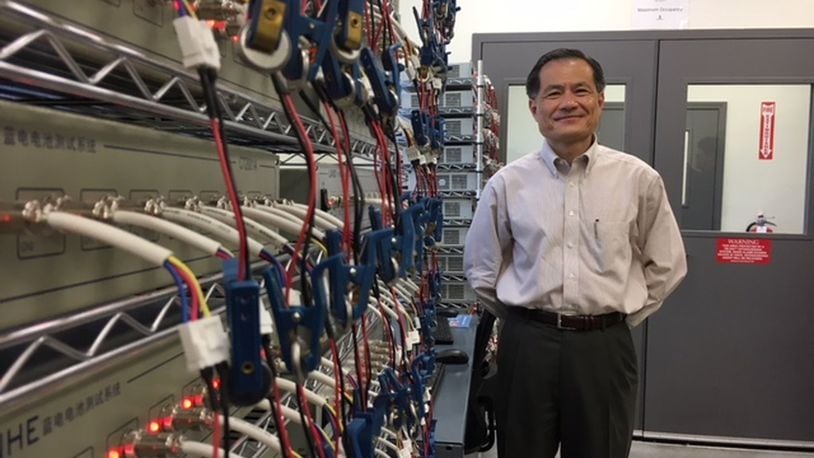Global Graphene Group — also known as “G3” — is the holding company for Angstron Materials, Honeycomb Battery and Nanotek Instruments. Together with a new division, Angstron Energy Co., the companies work on commercializing uses for its material called “graphene.”
The company and its approximately 90 employees hail graphene as having great strength, lightness, flexibility and thermal conductivity — and, crucially, resistance to fire. G3 says graphene is finding uses in new batteries, both for vehicles and phones, as well as tires, inks, lubricants, thermal films and more.
Last May, the company gathered friends and investors at one of its buildings, 1235 McCook Ave., to perform a live demonstration of how its material rendered a battery non-flammable. (That demonstration can still be found on YouTube).
Sixteen years ago, Bor Jang — a former dean of the Wright State University College of Engineering and Computer Science and today G3 chief executive — discovered graphene and has described it as a single layer of carbon atoms bound to neighboring atoms in a honeycomb structure.
Jang has called graphene “the next answer.” And in the wake of the infamous 2016 Samsung Galaxy phone battery fires, some observers may be starting to agree.
“We have advanced this technology substantially, and it is being evaluated by brand owners,” said Edward Chan, G3 executive vice president.
Chan said G3 has signed non-disclosure agreements with the companies involved, so he couldn’t identify them. But he said some significant players are involved, interested in what G3 calls its “Triple-A” fire-resistant battery technology.
“They are global, well known companies,” Chan said.
Aaron Blake, G3 battery scientist, said the company has received attention at trade shows and beyond.
“We’ve done a number of different things,” Blake said. “But talking specifically about this Triple-A protection for fire-resistant lithium-ion batteries — there’s a lot of interest in that from recent news.”
Added Blake: “We get approached all the time by big companies curious about, how do we solve this issue?”
The problem is a familiar one by now. In September 2016, the Federal Aviation Administration warned passengers not to turn on or charge their smartphones during flights. Passengers were told not to even put the devices in checked baggage. Google the phrase “exploding cell phone batteries,” and more than 380,000 results are returned.
“But no one is putting a solution forward,” Blake said. “And that’s what we’re doing.”
Teams of technical scouts have been testing the concept in Dayton, Chan said. The technology could perhaps find a place not only in smart phones, but vehicles, too.
“When you penetrate a regular one (battery), you will burn it,” said Winston Yu-Sheng Su, G3’s deputy chief technology officer. “You see a lot of fires. With our technology, you don’t see that.”
“That catches people’s eyes,” he added.
The company is working with JobsOhio and the Dayton Development Coalition on finding a fourth building, which Chan said will most likely be walking distance from the 1200 block of McCook.
Chan would not discuss precise revenue figures, he said the company is cash-positive.
G3 is also working with JobsOhio on finding the right people, including candidates from out of state.
Asked about his biggest need at the moment, Chan said simply: “We need good people.”
About the Author
